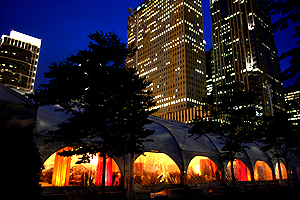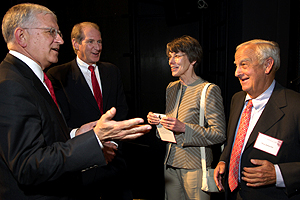City’s skyline sets scene for farewell to 12th President
By Jennifer CarnigNews Office
  President Randel (left) and his wife, Carol, receive well-wishes from James Crown (second from left), Chairman of the Board of Trustees, and Edgar Jannotta (right) at a farewell reception at the Joan W. and Irving B. Harris Theater for Music and Dance in Millennium Park. The dinner tent lights-up under the city’s night skyline for the event, which was attended by 350 friends and colleagues of the Randels. | |
Friends and colleagues are usually one and the same for Don Michael Randel, and on Thursday, June 1, many came out to honor and thank the departing President as he prepares to leave Chicago to take on his next challenge as president of the Andrew W. Mellon Foundation.
More than 350 people attended festivities in the Harris Theater at Millennium Park to toast Randel, who has served as President of the University since 2000, and wish him and his wife Carol well as they enter the next phase of their lives.
The Patricia Barber Quartet entertained guests with a musical performance, and Randel was praised by James Crown, the Chairman of the Board of Trustees; Joan Harris, for whose late husband, Irving, the Harris Theater and the University’s Graduate School of Public Policy Studies are named; and Edgar Jannotta, Life Trustee and former Chairman of the Board of Trustees.
Provost Richard Saller applauded Randel for his remarkable talents in running a complicated, distinctive University with “a tone of decency, respect and trust.”
During his tenure at Chicago, Randel has substantially broadened the range of interactions the University has with the city of Chicago, while also strengthening the humanities and the arts on campus and leading the University’s Chicago Initiative, the $2 billion capital campaign.
Beyond the University’s work in the city of Chicago—including the creation of several joint programs with the city along the Midway Plaisance, a highly successful neighborhood charter school and the Collegiate Scholars Program—it also has, under Randel, continued to strengthen programs in the physical and biomedical sciences and its relationship with the Argonne National Laboratory.
“He was modest about his contribution to the very important work of retaining the contract to operate Argonne National Laboratory for the Department of Energy, claiming he received undue credit for simply showing up in the right Energy Department Offices,” Saller said. “But he did much more by articulating the University’s responsibility as the site of the first controlled nuclear fission to develop that legacy to the benefit of mankind by completing research to close the nuclear fuel cycle. I suspect that he is the only medieval musicologist in the world able to discuss actinides in the fuel cycle. As a result, his leadership has positioned the University well for winning the Argonne contract and, more important, intensifying the scientific collaborations.”
Randel came to Chicago after 32 years at Cornell University, where he had served as a faculty member in the department of music and in many administrative posts, including department chair, vice-provost and associate dean and then dean of the College of Arts and Sciences. He became provost of Cornell University in 1995.
“Don, despite the lack of prior affiliation, arrived on campus with an extraordinarily fine ear for the institution’s particular—even peculiar—values and an unparalleled capacity to articulate them,” Saller said. “In an era when a book is published every month decrying the commercialization and commodification of higher education, Don reassured faculty and students about our values. He did so in front of audiences of hundreds and one-on-one with faculty. His presentations were spiced with Spanish proverbs, warm humanity and a breathtaking range of learning. He was credible in representing the University to itself—no mean feat when his audience was 1,200 of the smartest, most critical minds in the world.”
Randel’s tenure comes to an end Saturday, July 1, when he becomes president of the Mellon Foundation. He will succeed William Bowen, who was himself president of Princeton University when he accepted the Mellon presidency in 1988.
In his comments at the Millennium Park event, Randel mentioned that the Mellon Foundation “has been very good to the University.
“In fact it was only this past year that it was surpassed by the extraordinarily generous Gary Comer as the leading supporter of the University of Chicago,” he continued. “I can tell you that I will do my best to see that the Mellon Foundation moves back into first place.”
Randel is one of the nation’s leading musicologists and served as the editor of the Journal of the American Musicology Society. He also is editor of the Harvard Dictionary of Music 4th ed., published in 2003; the Harvard Biographical Dictionary of Music, published in 1996; and the Harvard Concise Dictionary of Music and Musicians, published in 1999.
Robert Zimmer will succeed Randel as the 13th President of the University. Zimmer served as a Professor for 25 years at the University, most recently as the Max Mason Distinguished Service Professor in Mathematics, before he became provost at Brown University in 2002.
![[Chronicle]](/images/sidebar_header_oct06.gif)